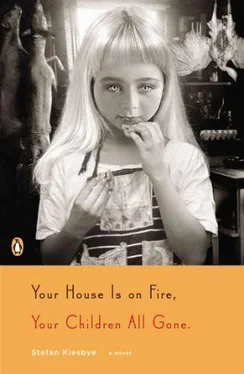Ilse was thin and her hair was as black as soot. Her skin was white and soft, and she complained every day about her large hands and feet. “Ladles,” she said and spread her long fingers in front of my face. They were rough and red from work in the garden and kitchen, and every night she rubbed creams and balm into her skin. Every morning Ilse forced her feet into the tiniest shoes and suffered the pain; she didn’t want to look like a clown.
Her heart beat for Rutger von Kamphoff, and his for Ilse. Yet his parents owned the Big House outside of Hemmersmoor; they were rich farmers and had different plans for their firstborn. Before her illness, they’d met on the moor every week, and now she hadn’t seen him in twenty days. The rumors that Rutger had a new girl every time he came to the village had never bothered her, but the longer she had to stay in bed, the moodier she became. She had dark shadows under her eyes, and her skin had a greenish shimmer.
One night not long after Epiphany, when her parents were out visiting a neighbor, the doorbell rang. I had read to Ilse, as usual, and now shouted for Irene, who came down the stairs to see who was at our step. Very soon after, she poked her head into the room and said, “Just a beggar woman with her two children.”
“What did she want?” Ilse asked.
“Don’t be stupid,” Irene replied. “She said her children were cold and they were looking for a roof over their heads for the night.”
“Did you open the barn for them?” Ilse asked.
“I sent them away. Mother and Father are gone. I can’t decide such things.”
After Irene left, Ilse and I hurried to the window, but although the night was clear, we couldn’t see the woman. “We should have offered her something warm to drink and let them sleep in the barn,” she said, yet just the few steps to the window had exhausted her. She felt dizzy and her knees buckled.
Two nights later she sent Irene to the manor house with a message for Rutger, then wrapped herself into a thick wool coat, and even though her forehead was still burning hot, she ran out onto the moor, waiting for her lover. The weather had changed again, snow was whirling around her, and she couldn’t see but a few yards in front of her. Her heart was beating as if it wanted to jump right out of her chest and kill her. She waited at their old meeting place for an hour; then the cold drove her away and back to the village.
She berated her sister on her return, but Irene assured her she had given Rutger the message. Ilse slapped her face until her eyes were running and her cheeks a deep crimson. Ilse called Irene names and tore out strands of her hair; still the younger sister claimed to have passed on the letter.
When the snow thawed at the beginning of February and the river once more moved our fathers’ boats, Jens Jensen found a woman and her two children frozen to death inside the ruin of the old cloister. It was the beggar woman Irene had sent from her door when she needed a place to sleep, and as news of Jensen’s find spread throughout the village, everyone gave reasons why they had not allowed her to warm herself and her children by their hearth. Everyone nodded and accepted any explanation given, because what else could they have done? They had all sent her away. They’d all had good reasons.
The news of the beggar woman’s death afflicted Ilse. When I stepped into her room, she only stared glumly ahead. When I read to her, she offered no comments and didn’t pay any attention to the heroines’ dresses or deeds. What had happened to Rutger? Why hadn’t she received a note from him?
Finally she heard from Rutger, but she didn’t get a letter with a dried flower and words that jumped off the paper and begged her heart to dance. She didn’t get a note saying how much he wanted her to come out onto the moor. Instead, one morning at the bakery, Gertrude Böttcher broke the news to the women buying their bread and pastries and jams and ordering cake for the weekend. “He’s marrying Frick’s daughter. Not what his clan had hoped for, but the dowry’s good. They’d also better hurry with the wedding, or she’ll look like a cow in a white dress.” Ilse and I stood with all the others in a circle around her.
The women of Hemmersmoor clucked and screeched. The wedding was news, good news, and Anna Frick’s shame of carrying a child beneath her heart before the wedding added spice to the dreary February days of sleet, slosh, and faded colors. Over the din in Meier’s bakery, no one but me noticed how quiet Ilse had grown, how all blood had left her skin, how the doubts she’d collected for over a month now weighed her down. When we left the bakery, she looked as pale as death itself, and two days later she was bedridden again, this time until the crocuses started to show their gentle heads.
The beggar woman had been buried weeks ago, quickly and unceremoniously, but Jens Jensen, who, because he’d found her dead, now considered himself an expert on the matter, claimed her death was a bad omen and that Hemmersmoor should be prepared for tragedy. Of course, Jensen always expected bad things to happen, and if one of the men bought him a drink at Frick’s, he’d spool off any number of bad omens he’d observed during his long days on the peat bog.
In March we learned that the wedding would be held in June; Rutger and Anna’s child was expected the month after. Even Ilse and her parents had received an invitation. She showed the card to me, letting her finger glide across Anna’s name. “Can you imagine this?” she asked. “She’ll now become the mistress of the Big House.” Yet she seemed to be doing better. She appeared again in the streets of the village and inside Meier’s bakery. She held her head high.
I suspected nothing. I had not the slightest shimmer of what Ilse had set out to do. The preparations must have been the ugliest part. Yet to taste revenge, you mustn’t care about the smell of its ingredients. Rutger’s betrayal had devastated her, but now that she was herself once more, she also understood the advantage of their secret relations. No one in the village pitied her or harassed her with questions about her heart’s well-being. Ilse’s heart had been awakened, then strangled and finally cut out, yet there were no stains, no wounds, no evidence for curious gazes. During her sickness, the chores around the house had been left to Irene, who complained a great deal, but even now that she was no longer confined to bed, Ilse feigned weakness and dizzy spells to preserve her freedom.
Rumors started. The beggar woman’s ghost had been seen near the Droste. And when a little girl was found dead but untouched days later, the village was alerted to a new and grave danger.
The girl’s death had started a fire, now the villagers smelled smoke everywhere. Before the old doctor’s granddaughter was stillborn, neighbors wanted to have seen a gigantic black shadow hovering over the house. “It was the beggar woman,” the baker’s wife knew. Others saw cows, colts, and cats visit houses and farms after dark, and animals were clubbed to death to exorcise the beggar woman’s spirit.
By the time of Rutger’s wedding, the village had accepted the burden of the beggar woman’s curse. It was upon us, and no one knew how to lift it. When women felt the hour of giving birth draw near, they sent for the priest, yet even his presence could not ensure the safety of the newborn child.
One night in early spring many of us had gathered in Martha Dinter’s bedroom to assist her in childbirth. Her husband had been thrown off a horse and could be of no help. I boiled water and gave Martha fresh towels. Ilse assisted the midwife, and an hour after Martha’s boy had been lifted into the air and given his first scream he was dead, his face blue, his tongue swollen. “The beggar woman!” Martha cried out. “The beggar woman.” And the shame of having refused to help a mother and her children buried any doubt, any suspicion that might have led us to investigate the baby’s death. “We are victims of our own wrongdoing,” said Ilse, her arms and forehead still bloodied from that night’s birth. She looked tired and happy.
Читать дальше












